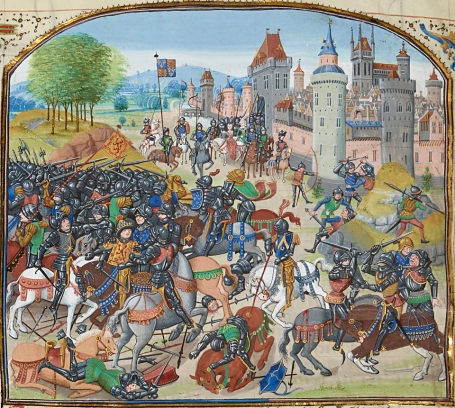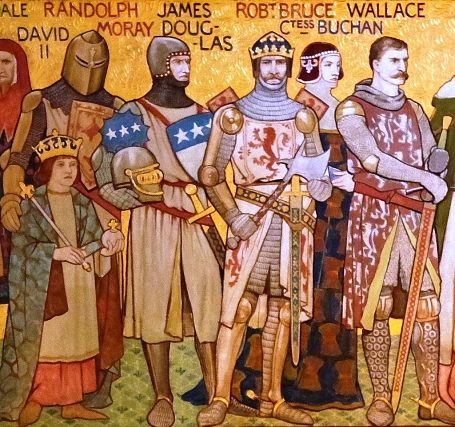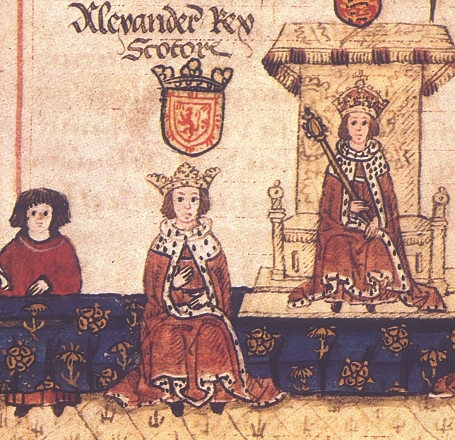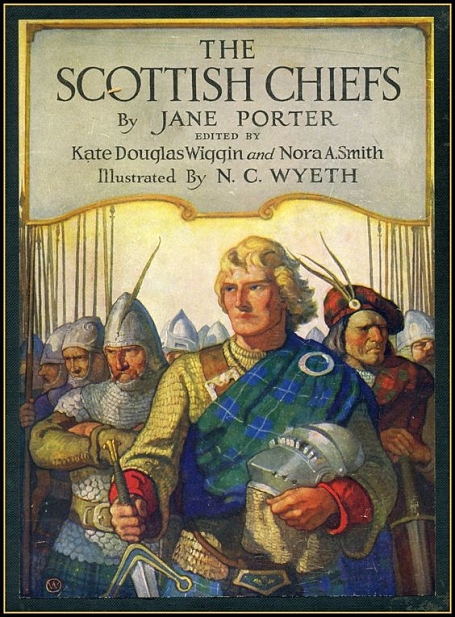The Life and Heroick Actions of the Renoun'd Sir William Wallace,
General and Governour of Scotland
by William Hamilton of Gilbertfield
Book I, Chapter III
How WALLACE kill'd Young Selbie the Constable's Son of Dundee.
Unto Dundee Young Wallace now is gone,
Sprightly and gay, as could be look'd upon,
Well shap'd and handsome, Cliver, neat and clean,
Clad with a Garment of a gemming Green.
The Constable old Selbie, liv'd hard by,
That crabbed Rogue, who most maliciously
Oppress'd the Scots; with great despite and rage,
A Son he had, near Twenty Years of Age:
Who some young Fellows with him ev'ry Day
Took to the Town to sport the Time away.
This vain young Fop, so much on folly bent,
Young Wallace saw, then straight unto him went
And with disdain, said, "Scot, I pray thee stay.
What Devil clad thee in a suit so gay:
A Horse's Mantle, was thy kind to wear,
And a Scots whittle at thy Belt to bear.
Rough Roulion Shoes, or any common trash
Did serve such Whore-Sons thro' the Dubs to plash.
Give me that Knife, under thy Girdle hings."
"Nay pardon me, Sir, I know better things;
Therefore forbear, I earnestly intreat,
It both defends me, and it cuts my Meat."
Selbie assaults him, and would tak't by force,
And so the Plea went on, from bad, to worse.
Fast by the Collar Wallace did him take,
Made the young Squire tremble there and shake,
His Dagger with the other Hand drew out,
In spite of all his Men so throng about:
And boldly without either fear or dread,
Upon the spot he stick'd young Selbie dead.
The Squire fell, of him there was no more,
And then his Men pursu'd young Wallace sore;
Who made a Pair of cleanly cliver Heels,
And so escap'd from all the South'ron Chiels.
The bloody Dagger fast held in his Hand,
And spared none that did his Flight withstand.
Unto an Inn he formerly did know,
Thither he fled, and could no further go.
"Help, help!" he cry'd, when the Good-Wife he saw,
"And save my Life from cruel South'ron Law."
With Russet Gown she quickly got him drest
Above his Cloaths, which cov'red all the rest:
A sudled Curch o'er Head and Neck let fall,
A white worn Hat then birsed on withal:
And as the South'ron came into the Inn,
Gave him a Rock, then he began to spin.
In quest of Wallace they some time have spent,
But could not know at what Door in he went:
They search'd thro' all the Corners of the Inn,
But he sat still, and cunningly did spin:
Tho' at the Trade he was not Prentice long,
He drew a Threed, and cron'd away his Song.
Away they went, then Wallace did revive,
And leugh, and smirtl'd at them in his Sleeve.
Like mad Men then, they all run up and down,
Cry, "Burn the Scots, leave none alive in Town."
Yet the Good-Wife kept Wallace until Night
Safe and secure, out of the Southrons sight.
Thro' a back Way she did convey him fast,
Where quietly he by the Water past.
Such was his Mother's great Concern, and Care,
That she of him did almost now despair.
At length she met him to her great surprise,
"Bless me, dear Son, may I believe mine Eyes?
Is't possible thou hast the Danger past?
Sure, Providence is more than kind at last."
There he inform'd her of his doleful Case,
At which she weep'd and often said alace!
"Ee'r thou leave off, thy Foes will have thee fang'd."
"Mother," he said, "I'd rather see them hang'd:
These English Lowns that do possess our Land,
Me-thinks we should most manfully withstand."
His Uncle knew he had the Squire kill'd,
Which the old Man with Grief and Sorrow fill'd:
Yet did abate when a few Days were past,
But dreaded Mischief to him at the last.
The English now most subtile ev'ry way,
A Ditty great 'gainst Scots prepared they,
For, at Dundee they call a Justice air,
No longer then durst Wallace sojourn there.
His Mother clad her self in Pilgrim's weed,
Then him disguis'd and both march'd off with Speed:
Nought to defend himself he had from Foes,
But a small Sword he bore below his Cloaths;
Away they went, none with them living moe,
When challeng'd, said, "To St. Marg'ret we go."
From South'ron Folk great Friendship thus they found,
Because St. Mar'gret was of English Ground.
Closs by Lindores the Ferry ov'r they past,
Then thro' the Ochell marched very fast:
Into Dumfermling lodged all that Night,
And on the Morrow by the Day was light
They travel'd with some English Gentlemen,
Who had their dwelling in Linlithgow then.
A Captain's Wife who had a Pilgrim been
Was there, who when she had young Wallace seen
Did him admire; because he was so fair,
Handsome, Gentile, and of engaging Air.
There merrily they past the time around,
Then cross'd the Forth straight to Linlithgow Town.
Where mutually a Complement or two
Was past, and then to Dunipace they go;
There Wallace Friend did dwell, a Parson great,
Wallace by Name, of opulent Estate:
A Man devout, who bravely made them fare
And share the best, the time they tarried there.
He did inform, and made them understand
The troubles great that then were in the Land,
Intreating them, in kind and homely Phrase,
There to abide, till God sent better Days.
Wallace reply'd, "I hasten to the West,
Our Kin are kill'd, were I at home, the best
Of South'ron blood, I hope, 'twixt you and me
To let it out; then I'll avenged be."
The Parson sigh'd, and said he much did doubt,
It would be long e'r that time came about.
"Come well, come woe, my Purpose I'll pursue,"
Then to the honest Parson bad adieu.
To Ellerslie he and his Mother went,
She on the Morrow for her Brother sent,
Who told her, to her Sorrow, Grief and Pain,
Her Husband and her eldest Son was slain.
That, when Sir Malcolm's Hough Sinews were cut
South'ron to death upon his Knees he put:
Till with their bloody Spears, they bore him down,
Then stick'd that Glorious Knight of great Renown.
Thus at Lochmabane, for their Country's sake,
A noble Exit these Two Heroes make.
To Ellerslie I back again repair,
Where good Sir Rannald met his Sister there:
Who did beseech and humbly pray'd also,
That to Lord Piercy forthwith he would go:
For from her House she would no longer fly,
But long'd at Home for to live quietly.
Sir Rannald in his Sisters Favours wrote,
And then to her a safe Protection got;
Which the brave Wallace highly did disdain,
Therefore no longer would with her remain.
Nor durst Sir Rannald entertain him there,
So to his shift, away does Wallace fare.
The English had the whole Strengths of the Land,
And what they did, none durst, nor could withstand:
Yet Wallace never could with them accord,
For be he Squire, be he Laird or Lord,
That with Disdain durst look him in the Face,
He got a Blow unto his great Disgrace.
The English Clerks in Prophecy have found,
A Wallace, should put them from Scottish Ground
Which afterwards prov'd to be very true,
For thrice he drove away that barb'rous Crew.
Sir Rannald now for him a Place prepares,
To keep him safe from English Traps and Snares,
With his own Uncle, who at Richardtoun
Did dwell, and was Sir Richard of Renoun.
In Heritage he had that whole Estate,
Tho' blind he was, which chanc'd thro' Courage great
'Gainst Englishmen; whom he did daily dare,
When he was Young, and well expert in War.
Then did he burst some Veins, and lost much Blood,
A Gentleman both Valiant, Wise, and Good.
In Februar, Wallace was to him sent,
And in April, a fishing from him went,
Which will afford some Sport as you shall hear.
Pray listen then with an attentive Ear.
The ballad, The Life and Heroick Actions of the Renoun'd Sir William Wallace, General and Governour of Scotland, by William Hamilton of Gilbertfield, 1722, is in the public domain.

The Kingdom of England and the Kingdom of Scotland fought dozens of battles with each other. They fought typically over land, particularly Berwick-Upon-Tweed, and the Anglo-Scottish border frequently changed as a result. Read more at Wikipedia.

The First War of Scottish Independence was the initial chapter of engagements in a series of warring periods between English and Scottish forces lasting from the invasion by England in 1296 ... Read more at Wikipedia.

Edward I (1239-1307), also known as Edward Longshanks and the Hammer of the Scots, was King of England from 1272 to 1307. Read more at Wikipedia.

Digitized version of The Scottish Chiefs, by Jane Porter, a novelization published in 1921 by Charles Scribner's Sons, about William Wallace and the First Scottish War of Independence. Read online at archive.org.